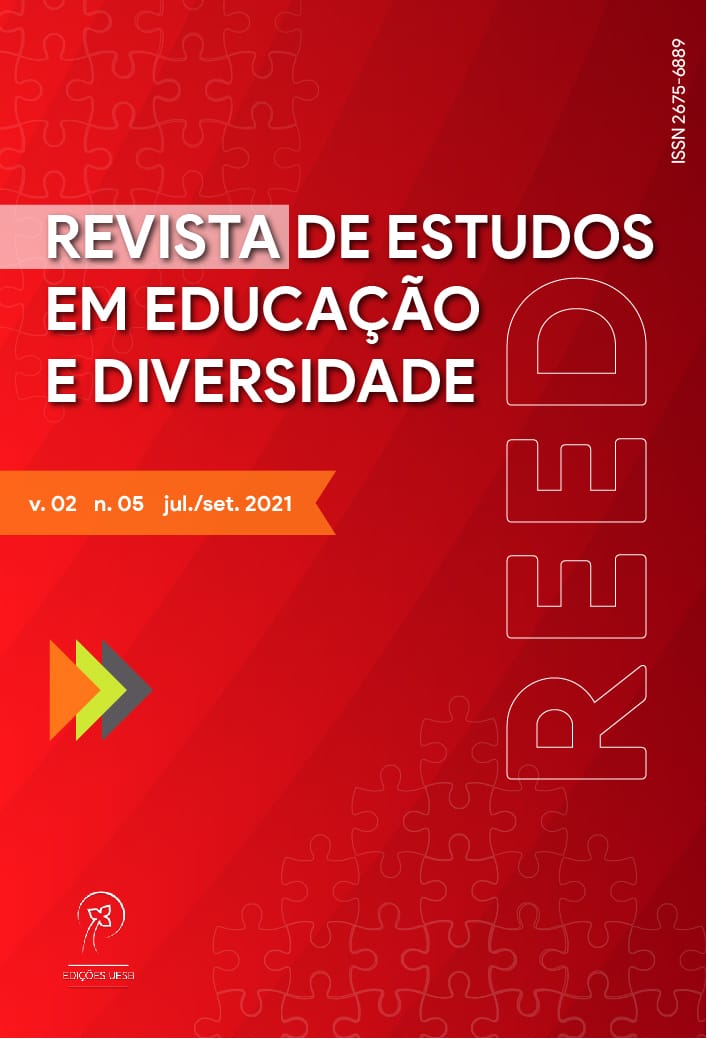ESCOLA PÚBLICA, FORMAÇÃO DOCENTE E AS TECNOLOGIAS DIGITAIS NO CONTEXTO DA PANDEMIA
DOI:
https://doi.org/10.22481/reed.v2i5.8836Palavras-chave:
Escola Pública, Formação de professores, Ferramentas tecnológicas, PandemiaResumo
Este artigo configura-se um breve estudo de cunho qualitativo, com caráter analítico, tendo aporte na leitura de bibliografias e na análise sociológica inspirada nas percepções de Bauman (2001, 2008a e 2008b). Os teóricos Bazzo & Andreatta-da-Costa (2019), Canário (2005), Kenski (2012), Sancho (2006) e Libâneo (2020) contribuem para o ambiente da discussão tencionando o olhar para a formação docente, tanto inicial quanto continuada, em perspectiva humanizada face as suas ações na e no pós-pandemia. Sua finalidade está em refletir o tema da formação docente confrontada com o uso das ferramentas tecnológicas digitais, mediante o contexto atual da pandemia. No entanto, entende-se que: a) do ponto de vista do homem líquido-moderno, a educação brasileira se configura na condição de produto para o mercado capitalista, objetificando as suas práticas no tempo-espaço agorista, fluido e liquidado; b) há necessidade de rever as ações pedagógicas, no contexto da pandemia; c) a escola pública brasileira, recebe como desafio formar o corpo docente buscando sensibilizá-lo para o uso das ferramentas tecnológicas digitais; d) considerando que as ações humanizadoras são indispensáveis nas práticas cotidianas da escola pública torna-se pertinente os espaços reflexivos e dialógicos ensejando a continuidade das aprendizagens escolares.
Downloads
Referências
BAUMAN, Zygmunt. A sociedade individualizada: vidas contadas e histórias vividas. Rio de Janeiro: Zahar, 2008a.
BAUMAN, Zygmunt. Modernidade Líquida. Trad. de Plínio Dentzien. Rio de Janeiro: Zahar, 2001.
BAUMAN, Zygmunt. Vida para o consumo: a transformação das pessoas em mercadoria. Trad. de Carlos Alberto Medeiros. Rio de Janeiro: Zahar, 2008b.
BAZZO, Walter Antonio; ANDREATTA-DA-COSTA, Luciano. A Revolução 4.0 e seus impactos na Formação do Professor em Engenharia. Revista de Ensino de Engenharia, v. 28, n. 3, p. 28-39, 2019. http://revista.educacao.ws/revista/index.php/abenge/article/view/1542. Acesso em: 02 abr. 2021.
CANÁRIO, Rui. O que é a escola? Um “olhar” sociológico. Porto: Porto Editora, 2005.
KENSKI, Vani Moreira. Educação e tecnologias: um novo ritmo da informação. 8. ed. Campinas: Papirus, 2012.
LIBÂNEO, José Carlos. Que educação queremos no pós-pandemia? 2020. (2horas26seg). Disponível em: https://www.youtube.com/watch?v=_ZZSxJmuzQ8l. Acesso em: 14 set. 2020.
SANCHO, Juana María Gil. De tecnologias da informação e comunicação a recursos educativos. In: SANCHO, Juana María Gil et al. Tecnologias para transformar a educação. Porto Alegre: Art-Med, 2006.
Downloads
Publicado
Como Citar
Edição
Seção
Licença
Copyright (c) 2021 Revista de Estudos em Educação e Diversidade - REED

Este trabalho está licenciado sob uma licença Creative Commons Attribution 4.0 International License.
Você é livre para:
Compartilhar - copia e redistribui o material em qualquer meio ou formato; Adapte - remixe, transforme e construa a partir do material para qualquer propósito, mesmo comercialmente. Esta licença é aceitável para Obras Culturais Livres. O licenciante não pode revogar essas liberdades, desde que você siga os termos da licença.
Sob os seguintes termos:
Atribuição - você deve dar o crédito apropriado, fornecer um link para a licença e indicar se alguma alteração foi feita. Você pode fazer isso de qualquer maneira razoável, mas não de uma forma que sugira que você ou seu uso seja aprovado pelo licenciante.
Não há restrições adicionais - Você não pode aplicar termos legais ou medidas tecnológicas que restrinjam legalmente outros para fazer qualquer uso permitido pela licença.






